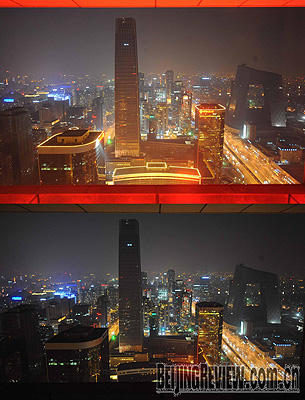| New IPR Regulations
China's Supreme People's Court has urged lower courts to deprive intellectual property rights (IPR) violators of their ability to continue infringements. In its new guidelines on the implementation of China's IPR protection strategy, the court also urges protection of the legal rights of victims.
 |
|
GOING DARK: A combination picture shows downtown Beijing before and after the lights were turned off for Earth Hour on March 28. About 20 Chinese cities joined a worldwide campaign to switch off unnecessary lights for one hour to support energy-saving efforts and show concern over global warming (LUO XIAOGUANG) | "Comments of the Supreme People's Court on Implementing the National Intellectual Rights Protection Strategy" urges lower courts to strengthen cooperation with other judicial or administrative departments.
The guidelines give direction on dealing with 16 varieties of IPR infringement cases relating to patents, trademarks, copyrights and new plant species.
More Blue Skies
Beijing saw 73 "blue-sky days" in the first three months of 2009, Beijing authorities announced on March 31. Blue skies amounted to 81 percent of the total for the quarter.
The city experienced six more blue-sky days than in the first quarter of last year, an official with the Beijing Municipal Environmental Protection Bureau told Xinhua News Agency.
Experts at the bureau said active cold airflows had helped disperse particulate matter.
Efforts to reduce pollution from heating systems paid off, with January experiencing the most blue-sky days since 2000, said the official. The bureau is aiming for a blue-sky rate of 71 percent this year.
Beijing has a five-grade air-quality classification system: a reading below 50 is "excellent;" from 51 to 100 "fairly good;" 101 to 200 "slightly polluted;" 201 to 300 "poor;" and more than 301 "hazardous." Days with excellent or fairly good air quality are counted as blue-sky days.
Training Counselors
Sixty primary- and middle-school guidance counselors in the quake-hit Sichuan Province began a five-day professional training on March 30 to enable them to better help traumatized students recover.
The trainees came from 10 counties or cities severely hit by the May 12 quake last year. They will receive training on mental health, emotional management and therapeutic counseling at the Southwest China University of Nationalities in Chengdu, capital of Sichuan.
The lectures, organized by the Sichuan Educational Department, will be given for free by psychological experts from Southwest China University for Nationalities, Sichuan University and medical research institutions based in the United States.
Blood Transfusion Accident
At least 64 people were infected with hepatitis C virus (HCV) after receiving blood transfusions in a county hospital in Guizhou Province, the local government said.
An unnamed patient who received a blood transfusion in March 2001 during an operation in the People's Hospital of Pingtang County fell sick and was confirmed HCV-positive by two other hospitals last September, said Xie Yong, Vice President of the county-level hospital.
Hospital staff traced the blood to donor Li Cailing, 43, a native of Jiangsu Province who sold 20,000 ml of blood to the hospital from October 1998 to June 2002. Li was confirmed as an HCV carrier last October.
The hospital launched emergency investigations into all patients on record who had received Li's blood. Tests showed 64 people were infected.
Learning Chinese Craze
A recent Ministry of Education press conference announced that the global craze for studying Chinese has attracted 40 million learners overseas.
China has established over 300 nonprofit Confucius Institutes in 78 countries and regions to spread the Chinese language and culture.
In 2008, a total of 223,500 foreign students from 189 countries and regions studied in China, up 14.32 percent year on year.
| 